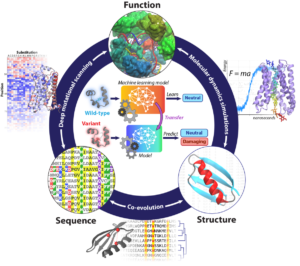Diwakar Shukla a Blue Waters Associate Professor of chemical and biomolecular engineering at the University of Illinois Urbana-Champaign—has received the highly prestigious Maximizing Investigator’s Research Award (MIRA) from the National Institute of General Medical Sciences (NIGMS), part of the National Institutes of Health. The award, which grants $1.9 million over five years (2021-2026), will support his work on developing machine learning methods and high-throughput experiments for studying membrane proteins.
“MIRA is a tremendous honor for my research group, and it speaks to all the hard work of the group members,” Shukla said. “This award allows me to devote more time and energy to mentoring trainees and enhances our ability to produce important breakthroughs.”
Shukla’s research program is focused on the fundamental molecular understanding of cellular processes and structure-function relationships of proteins. Over the past years, he has established a vibrant and imaginative research program at the interface of molecular biology, computational sciences, and physical chemistry.

With support from the MIRA award, Shukla’s research group will expand the scope of their research by integrating high-throughput experimental techniques, such as deep mutational scanning, into their research. These experiments are crucial for validating computational results, but they also provide data for developing new machine learning techniques to aid our understanding of the relationship between protein sequence, structure, and function.
“The MIRA award aims to understand the regulation of molecular functions such as the transport of neurotransmitters in the brain and nutrients in plants, which are performed by membrane proteins,” Shukla said. “Investigating these proteins at an atomistic level provides us with a unique vantage point for not only understanding their function but also to enable the design of future interventions.”
The goal of the MIRA program is to increase the efficiency of NIGMS funding by providing investigators with greater stability and flexibility, thereby enhancing scientific productivity and the chances for important breakthroughs.
Shukla has received numerous early-career faculty awards from the American Chemical Society, American Institute of Chemical Engineers, Foundation for Food & Agriculture Research, Alfred P. Sloan Foundation, and the National Science Foundation. At Illinois, Shukla has been recognized for his research and teaching: he has been awarded the Dean’s Award for excellence in research; named a Lincoln Excellence for Assistant Professors(LEAP) scholar; and earned the School of Chemical Sciences’ Teaching Excellence Award.

